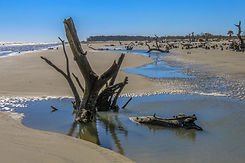
Bulls Island, updated 4/12/25
Bulls Island is a pristine, untouched barrier island, the largest among four islands in the Cape Romain National Wildlife Refuge. Established in 1932, the refuge primarily aims to protect and conserve wildlife and their natural habitats. Encompassing 5,000 acres, Bulls Island is a thriving maritime forest featuring a mix of fresh and brackish water impoundments and a beautiful beach area. The island's many roads and trails offer ample opportunities for hiking and observing the diverse wildlife.
What is Bulls Island?
“I go to Nature to be soothed and healed, and to have my senses put together.”
–John Burroughs
Uninhabited and spanning 6.5 miles, Bulls Island remains largely unaltered by human activity, providing a haven for countless native and endangered species. The island is renowned for its thriving bird population, boasting over 275 species in and around the area. Situated at 5801 U.S. 17 North in Awendaw, the Cape Romain National Wildlife Refuge is approximately 20 miles north of Charleston. Access to Bulls Island is limited to private boats or ferry services. Coastal Expeditions provides a variety of tours to the island, including beach drops and sunrise expeditions. To reach the island from Charleston, take U.S. 17 North through Mount Pleasant and turn off at Garris Landing. A ferry operates twice daily during the summer season (Tuesdays, Thursdays, Fridays, and Saturdays) and on Saturdays only in the winter. Embark on a journey through the estuaries, and, with a bit of luck, you may be greeted by a pod of dolphins as you approach the island.
Bulls Island Photo Gallery
Explore the photo gallery below and explore all that this untamed beauty in Cape Romain Refuge; a 5,000-acre maritime forest, pristine beaches, and 275+ bird species. Discover serene trails, sunrise expeditions, and possibly spot dolphins. A natural paradise, just a ferry from Charleston.








Coastal Expeditions Summer 2024 Bulls Island tour Schedule
The Bulls Island Ferry is operated by Coastal Expeditions and they have an updated schedule for 2024, offering more flexible options for visitors during the Spring and Fall seasons. Coastal Expeditions’ current schedule offers visitors choices from 3.5-hour, 4-hour, or 6-hour day trips to explore the island every Tuesday, Thursday, Friday, and Saturday. The spring schedule runs from March through May, while the Fall schedule is from October through December. Morning trips depart at 9 am, with a choice of returning either at 12:30 pm or 3 pm, while afternoon trips start at 12:30 pm and end at 4:30 pm. The summer schedule runs from June-September, and it is a specialized schedule to accommodate the seasonal tides and environmental conditions of summer. The summer time day trips are 5.5 hours from the beginning to end. No need to specify the desired end time when booking a 9 am trip prepare for the duration you prefer and consult with the ferry crew on the day of your journey if you have any questions.


What is Coastal Expeditions?
Since 1992, Coastal Expeditions has been committed to guiding and sharing the beauty of South Carolina's Lowcountry: its lands and waters, plants and animals, people, history, and culture. Their mission is to put people safely and securely in the path of beauty, allowing them to experience meaningful connections with nature. As lifelong students and practitioners of environmental appreciation, they strive to create awe-inspiring moments that reveal the interconnectedness of our world. Coastal Expeditions is comprised of a passionate team of "guides, explorers, and storytellers" who continuously study Lowcountry tides, flora, fauna, and history. They work tirelessly to create new routes and maps, ensuring unique natural experiences that are awe-inspiring and tantalizing the imagination and senses. Experiencing the Lowcountry's natural, mystical, and magical aspects fosters a profound love and respect for this unique region. Their goal is to facilitate "soulful journeys" that allow individuals to become part of the beauty around them. Whether it's the shimmering sunlight on the water, an ancient shark's tooth, or the rush of air through a pelican's wings, they strive to create lasting connections between people and the natural world and believe fostering these connections cultivates a deeper understanding of our place within the universe and inspires a desire to care for our environment.



